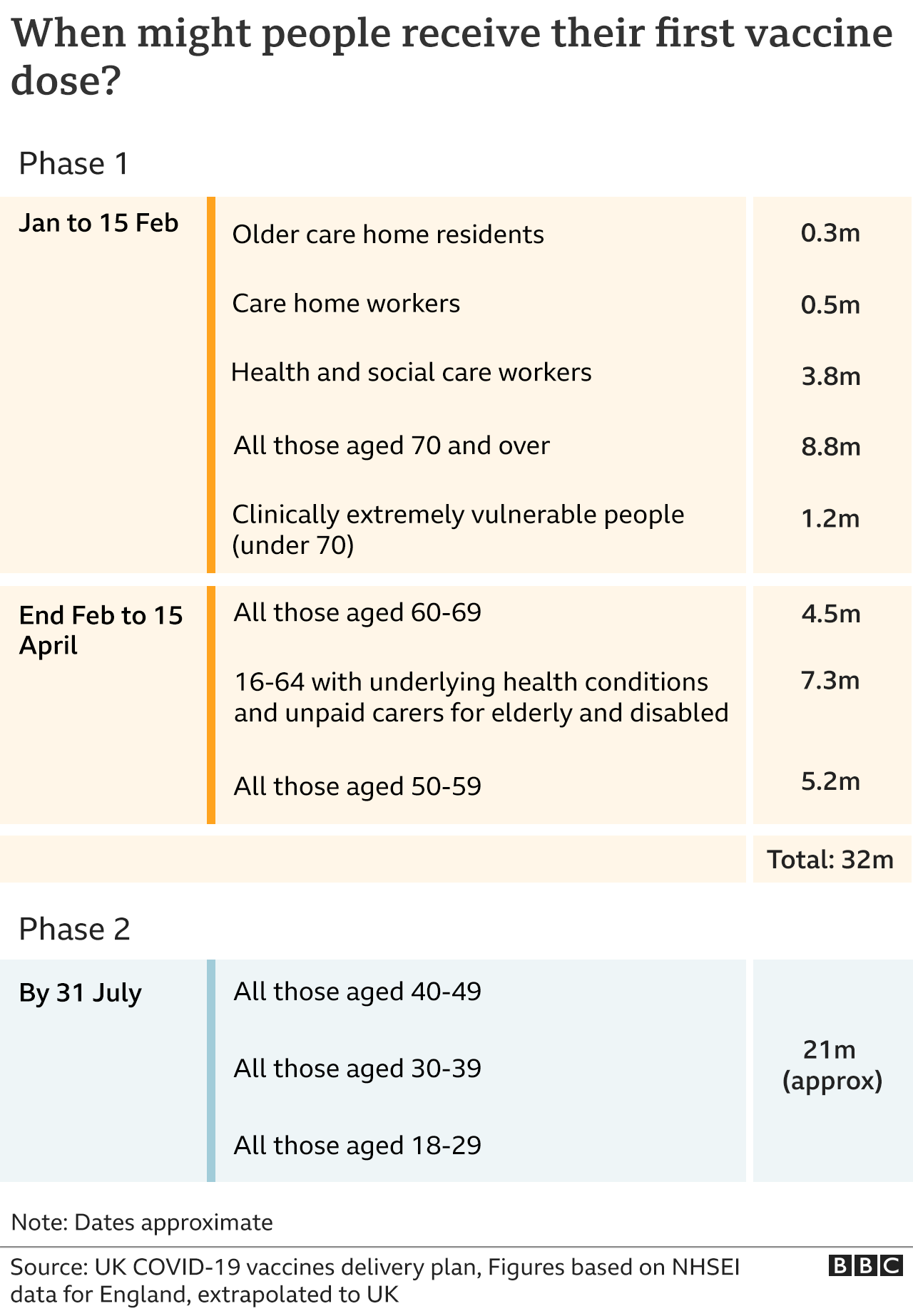The NHS has warned of a "significant reduction in the weekly supply" of Covid vaccines in England next month in a letter to local health organisations.
The letter says there has been a "reduction in national inbound vaccines supply" and asks organisations to "ensure no further appointments are uploaded" to booking systems in April.
The health secretary said it was a "standard" letter.
The BBC understands no-one who has booked a vaccine should lose a slot.
Asked about it during a Downing Street coronavirus briefing, Matt Hancock said the NHS regularly sent out "technical letters" that explained the "ups and downs" of supply.
BBC political editor Laura Kuenssberg has been told that fewer AstraZeneca vaccines are available than expected.
I'm told the problem is fewer Astra Zeneca vaccines are available than expected. There have been some other letters to health trusts about managing supply which has been 'lumpy' but this is more significant than previous bumps and lumps
— Laura Kuenssberg (@bbclaurak) March 17, 2021
A spokesperson for the company said: "Our UK domestic supply chain is not experiencing any disruption and there is no impact on our delivery schedule."
The letter from the NHS in England says that "over this next period it is vital" that health organisations focus on vaccinating those in the priority groups one to nine, who are most vulnerable to coronavirus.
It advises vaccination services to work with local authorities, voluntary community and faith organisations "to put in place reserve lists" of people eligible for the vaccine - as well as targeting areas of lower uptake.
The NHS says vaccination centres and community pharmacy-led services should close unfilled bookings from the week commencing 29 March.


A degree of mystery surrounds this slow-down. Government sources are suggesting the amount produced by AstraZeneca is below the expected yields. The firm has yet to comment publicly, but behind the scenes it has suggested this is not the case.
Given the EU has warned it may restrict exports - all the UK's Pfizer supply comes from the continent - questions are being raised whether this might be part of the reason.
But it seems a little too soon to assume that will definitely happen by the end of the month.
What we do know is that for the next two weeks there is "bumper" supply thanks to a large shipment of AstraZeneca from India to supplement UK stocks.
It could mean more than four million doses a week being given. That was always going to drop in April to under three million.
The latest news suggests it could perhaps go down below two million which, given significant numbers of second doses need to be given from next month, would mean the rollout to the under-50s would be slower than some had started to hope.

Earlier, it was announced that almost half of British adults have received their first dose of a coronavirus vaccine - more than 25 million people.
Around 1.7 million people have also had a second dose.
During Wednesday's briefing, Mr Hancock said the UK was "ahead of schedule" to offer a first dose to all over-50s by 15 April.
He also reiterated a commitment to ensuring that all adults in the UK are offered their first dose of a coronavirus vaccine by the end of July.
Speaking alongside the health secretary, Mary Ramsay, head of immunisation at Public Health England, said "every day we vaccinate more people we are preventing more deaths".
And England's deputy chief medical officer, Prof Jonathan Van-Tam, said there was "no evidence" that the Oxford-AstraZeneca vaccine causes an "increased risk" of blood clots.
The EU's medicines regulator has said it remains "firmly convinced" that the benefits of the jab outweigh the risks, after several leading EU states paused their rollouts.
Prof Van-Tam added that all medicines have both side effects and benefits, and listed some of the rare side effects of paracetamol as examples, pointing out that most people had no issue with taking it.

BBC politics correspondent Jonathan Blake said the hold-up would have an impact on the momentum of the vaccine rollout and possibly the government's targets.
Labour shadow health secretary Jonathan Ashworth tweeted that people "across the country" would be "anxious and worried" about the news of delays.
"Matt Hancock must explain what the issue is with supply and what efforts are being made to resolve them," he added.
On Wednesday, European Commission President Ursula von der Leyen said that if Covid vaccine supplies in Europe do not improve, the EU "will reflect whether exports to countries who have higher vaccination rates than us are still proportionate".
The EU and the UK have been engaged in a diplomatic row over the export of the vaccines, exacerbated by post-Brexit disagreements.
Also during the briefing, Mr Hancock confirmed that shielding guidance in England would end on 31 March - meaning that more than 3.7 million vulnerable people in England will no longer have to shield.
A further 141 people in the UK have died within 28 days of a positive test, according to the government's coronavirus dashboard. A further 5,758 people have tested positive.


https://news.google.com/__i/rss/rd/articles/CBMiL2h0dHBzOi8vd3d3LmJiYy5jby51ay9uZXdzL3VrLXBvbGl0aWNzLTU2NDM1NTQ50gEzaHR0cHM6Ly93d3cuYmJjLmNvLnVrL25ld3MvYW1wL3VrLXBvbGl0aWNzLTU2NDM1NTQ5?oc=5
2021-03-17 21:08:59Z
52781441590237
Tidak ada komentar:
Posting Komentar